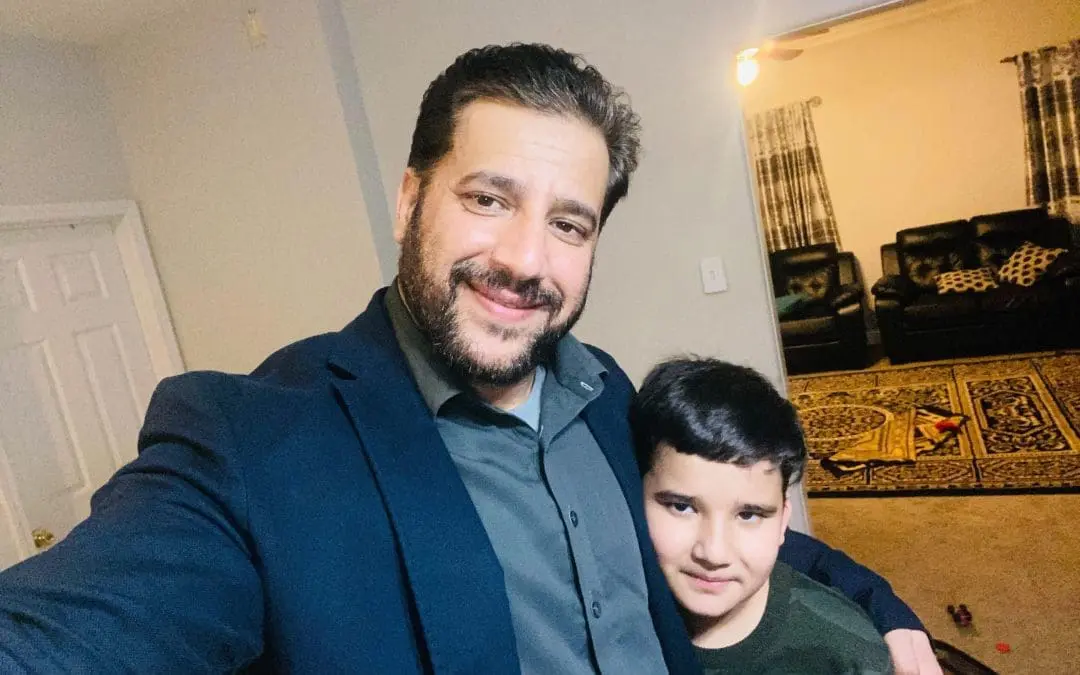When the team at Bilingual International was putting together the federal grant application for the SASIC (Services to Afghan Survivors Impacted by Combat) program, there was only ever one candidate envisioned as the project’s coordinator: Haroon Safi. Especially since the arrival of Afghan evacuees in 2021, Haroon had been working long volunteer hours in the community, using his language skills and knowledge of resources in St. Louis to try to make life easier for new arrivals. With his military contractor background, his lived experience of resettlement in St. Louis, his extensive ties in the nonprofit and faith communities, and his ability to communicate effectively and empathetically with diverse parts of those communities, he always seemed like an ideal option for assisting Afghan allies with adjusting to a new life here.
Adjusting to a new life is something that Haroon has done multiple times. In the mid-90s, his family left their native Kunar province of Afghanistan during the Civil War and relocated to Pakistan. Moving out of an active war zone where the family feared daily for their lives was necessary, but it meant that they truly had to abandon everything and start over in a new country. What he didn’t know at the time was that he would be doing so again, 20 years later, and in America.
After returning to Afghanistan during the US mission and attending school for law and political science in Kabul, Haroon took on a number of jobs in security and logistics. These positions warranted a Special Immigrant Visa (SIV) entry to the United States reserved for allies of coalition forces. He applied for this designation in 2012, and was ready to make his move two years later when it was approved for him, his wife, and children. “I came with nothing but a connection to an aunt who lives in St. Louis,” recounted Haroon, “we stayed with her for a short time and started from there.” Despite the familiarity with coalition forces, adjusting to Western culture wasn’t easy for the Safi family. Haroon was the only one who spoke English and could drive. Establishing a life in St. Louis meant getting his kids enrolled in school, finding doctors, buying a car, setting up a bank account, finding a job, getting insurance, the list goes on and on. Beyond paperwork and logistics, the Safis had to learn social norms, make friends, find a community, and feel safe in their new home.
After the fall of Kabul in 2021, Haroon drew on his family’s experiences to act as an emergency resource to new arrivals. With tens of thousands of Afghans arriving to a stripped-down resettlement infrastructure unable to adequately respond, stories began to circulate of Afghans living in hotels in St. Louis in less than optimal conditions. Haroon sought these new arrivals out and began visiting and providing language and emotional support. On top of a full-time position as a Security Director, he found himself accompanying people to doctor’s appointments, the DMV, finding them clothes and food, prepping them for job interviews, securing housing and helping their children find schooling – interpreting in Dari and Pashto the whole time: “There was a clear need in the community that needed to be filled, so I did what I could.”
He was soon contacted by a woman who had been working with evacuated Afghan soldiers across the US. Many of the soldiers had been wounded and were suffering with Post-Traumatic Stress Disorder. Haroon was able to draw on his personal experiences with combat and relocation to provide a listening ear and support to people he’s still yet to officially meet or see in person. He was also becoming a dependable resource for area nonprofits needing to reach or check in on vulnerable arrivals. After working in a volunteer capacity with both Welcome Neighbor STL and the Islamic Foundation of Greater St. Louis, Haroon will be formally partnering with both of these organizations as they provide community support to SASIC clients.
As the SASIC Coordinator, Haroon is doing what he’s been doing every day for the last year and a half, but in an official capacity with even more access to partnerships and resources. He will be leading a team of four case workers and two therapists who will provide wraparound family case management and mental health services (including psychiatric services) for evacuated Afghan allies (those that arrived under the Operation Allies Refuge or Operation Allies Welcome programs). Afghan families that arrived in the US under different designations or at different times may be ineligible for SASIC programming, but Bilingual International retains parallel programming that can assist in most circumstances, as well as a dense network of providers and resources to lean on. The SASIC program is intentionally Afghan-led and Afghan-staffed in an effort to maximize linguistic and cultural access and best reflect the diverse Afghan community it is designed to serve. Moreover, Haroon and his team share the lived experience of the struggle to adjust to life in St. Louis as new arrivals from Afghanistan, and are able to help navigate the process and make things easier for more recent arrivals. Above and beyond helping families adjust and become self-sufficient, one of the attendant goals remains community building, or as Haroon puts it, “influencing families who will give back to the community once they’re settled and help it flourish.”
The SASIC program (HHS-2022-ACF-ORR-90ZZ0003) is funded through the Office of Refugee Resettlement. The effort to submit this grant was made possible in part by support from Missouri Foundation for Health.




